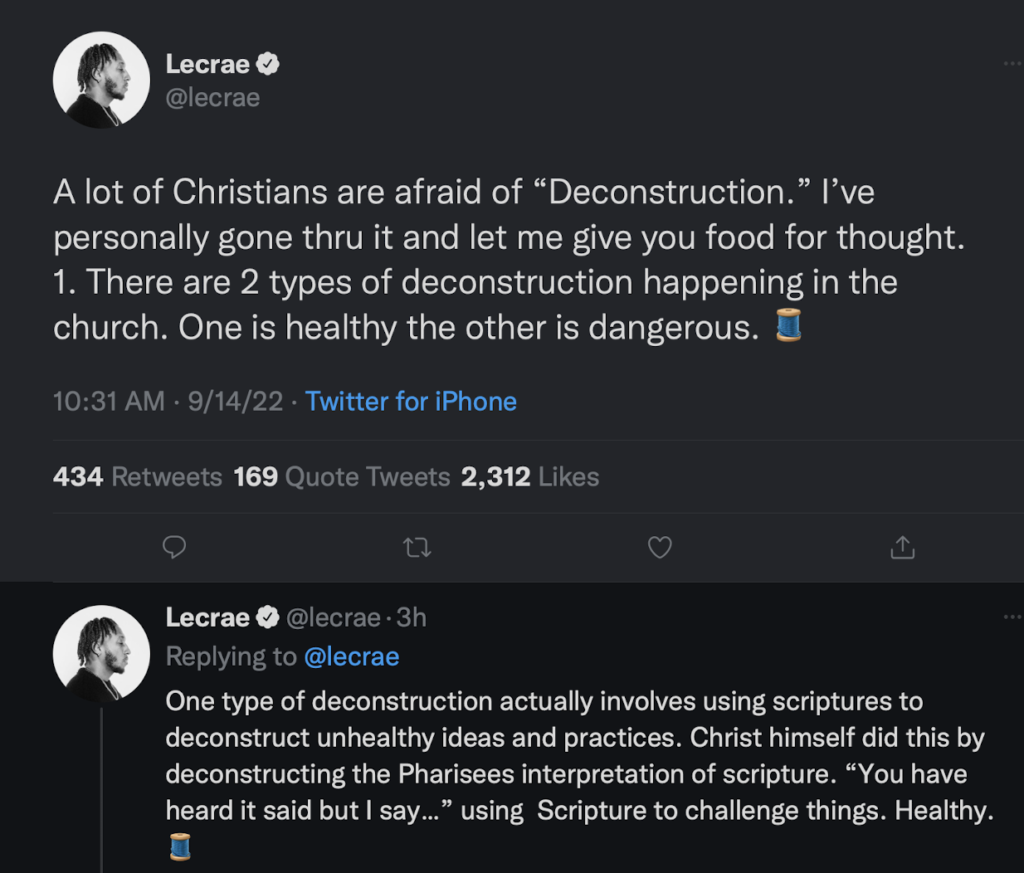When talking about things of faith, theological issues, it sure helps to use biblical terminology that has been around for thousands of years rather than current fad terms.
Case in point: Deconstruction. Popular terminology at the moment.
Ran across this tweet from Lecrae using this term and then having to explain and nuance it like crazy in order for it to mean two different things – because as he says he went through deconstruction also. It is the popular thing to do right now.

As I read his thread on the “healthy” kind of deconstruction, I said to myself, “You know, there’s a good biblical word for this that believers throughout the centuries as well as around the world today would understand.” That word is:
REPENTANCE
It would be helpful to use and explain that term, since apparently ‘deconstruction’ means what the individual using it wants it to mean. He goes on to say that there is construction, then deconstruction, then reconstruction. So when I’ve constructed some idea or belief or practice in my life, and I’m confronted by Christ and His truth in His Word on the matter, the Holy Spirit works conviction in my heart and mind that God is right and I am wrong on the matter, and I repent. I change my mind, belief, or practice to line up with God’s truth.
Somebody familiar with Christianity outside of an American culture and zip code can understand that. I was brought under conviction, and I repented.
I don’t really need to get that clear biblical idea all intertwined in the cultural lingo of the moment, saying that I “constructed” some beliefs, but then “deconstructed” those beliefs and then “reconstructed” them differently. It sounds like our faith is like buying some Ikea furniture, putting it together, then at the end finding out you did a step wrong, so you disassemble the whole thing and try again. It makes it all me-centered.
That example shows how using the lingo can actually confuse the matter. Rather simply, I was confronted by God’s truth about a matter and I repented of my false belief. I agreed with God. I didn’t “deconstruct” anything; I changed my mind to align with God’s truth on the matter.
Why such a big deal over this? I find it not helpful to call the repentance and aligning with God’s truth that true believers do with the same exact term the world uses for apostasy; walking away from Christianity in total, and then having to attempt to explain why I’m calling two completely different things by the same popular term.
Because the “unhealthy deconstruction” he goes on to speak of would be better described as “destruction” or “shipwreck.” They destroy what they thought was their faith.

I could not agree more with him and his underlying point here. What he is saying in so many words is what the Apostle John said:
Do not love the world or the things in the world. If anyone loves the world, the love of the Father is not in him. For all that is in the world—the desires of the flesh and the desires of the eyes and pride of life—is not from the Father but is from the world.
1 John 2:15-16 ESV
Or even more clearly by James:
Do you not know that friendship with the world is enmity with God? Therefore whoever wishes to be a friend of the world makes himself an enemy of God.
James 4:4 ESV
The phrase “culture takes precedence over Scripture” is another way of saying “love of the world”. But even here, there are good biblical terms for this that have worked for thousands of years and outside of our American zip codes: Love of the world, apostasy, fear of man, not counting the cost, etc. – take your pick. When these cause you to abandon all pretense and walk away from the gospel of Christ, declaring you no longer believe; that is not deconstruction – it’s apostasy – and its been going on for thousands of years; its not some new term. You haven’t broken the faith down into “deconstructible” parts and found some fallacy; it’s an eventual recognition that you’re unwilling to recognize that God is the Potter and you are merely clay, and that the Creator gets to set the rules for all of his creation, especially all of us clay pots. Instead, we want to live our short ‘vapor’ of a life as if we’re our own potter.
To bring this to a close, this post is just me thinking out loud about how influencers like this take both repentance and apostasy, two diametrically opposite conditions, and call them the same exact thing, in order to seemingly be able to say “I deconstructed too!” Because it’s really cool and relevant to have deconstructed these days.
I found this a good podcast with an in-depth look at “Evangelical Deconstruction” – the origin of the terms, what it means, and what the goals of it are:
https://justthinking.me/ep-117-evangelical-deconstructionism/